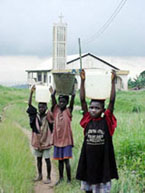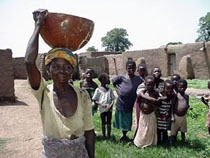
Granma,
March 22, 2005
World Water Day
Life at stake

Granma,
March 22, 2005
World Water Day
Life at stake
MARIELA PÉREZ VALENZUELA
A CubaNews translation by Robert Sandels.
Worldwide statistics on utilization of potable water by human beings are
chilling. One in five inhabitants of the planet lacks access to potable water and 40% of humanity lacks basic sanitation. In both cases the
result could mean death.
potable water and 40% of humanity lacks basic sanitation. In both cases the
result could mean death.
Other numbers to consider: consumption of poor quality water, about which the great communications media say nothing, is causing more deaths than current wars. Every day 3,900 children die because of diarrheic illnesses due to contaminated water or to deficient hygiene.
Many analysts agree that the Millennium Goals set by the UN to end poverty have little possibility of being met since water, which is fundamental for development, is lacking in many regions. And if water is present, it is under conditions that make it impossible to use it for improving quality of life.
There must be the political will to focus on the expansion of water and sanitation services on a global level.
The shortage of so-called “blue gold” is considered in many countries a humanitarian crisis to which little attention is paid, but, which undermines any efforts, if there are any, to improve economic and social conditions for millions of human beings.
The shortage of water also causes children and adults to neglect their daily
obligations because many have to walk kilometers to reach the nearest source of
water. This figures increasing in student absences and drop outs in schools--
where they exist.

It is understood that water resources are the foundation upon which sustainable development rests and that ecosystems and human sustenance depend on the rational and efficient use of this vital element. Agriculture, a fundamental necessity for survival, consumes almost 70% of available fresh water.
International organizations warn that many governments do not fulfill their obligation to help cut in half the number of people in the world who have no access to water.
Three years after the start of an international campaign to alleviate the water crisis, six agencies including WaterAid, the International Red Cross, and Oxfam, assure us that the world situation is getting worse.
The 2002 World Summit on Sustainable Development resulted in a global promise to reduce by half by 2015 the lack of access to potable water and basic hygiene.
These agencies maintain that the 22 principal industrialized nations have not increased their financial aid to improve the supply of water as they had promised, and they maintain that when there is assistance, many times it is offered for political reasons instead of necessity.
Scientists from several countries warn that if populations continue contaminating water, it is very likely that even with official resolve to alleviate the crisis, there will be no definitive solution. As long as we continue throwing trash into rivers and lakes there will be little progress along the tortuous road to deliver potable water to human populations.
On this day, which begins the International Decade for Action, sponsored by the
UN under the theme “Water, Fountain of Life,” it is indispensable to enlist the
consciousness of governments and peoples to combine their wills, not only to
preserve water but to distribute it more equitably and with better quality.

22 de marzo de 2005
Día Mundial del agua
La vida en juego
MARIELA PÉREZ VALENZUELA
FOTOS: AHMED VELÁZQUEZ
 Las
cifras mundiales sobre la utilización del agua potable por los seres humanos son
escalofriantes. Uno de cada cinco habitantes del planeta carece de acceso a agua
potable, y dos quintas partes de la humanidad están fuera del saneamiento básico.
En ambos casos, el resultado podría ser la muerte.
Las
cifras mundiales sobre la utilización del agua potable por los seres humanos son
escalofriantes. Uno de cada cinco habitantes del planeta carece de acceso a agua
potable, y dos quintas partes de la humanidad están fuera del saneamiento básico.
En ambos casos, el resultado podría ser la muerte.
Otros números para reflexionar: el consumo del vital líquido en mal estado, de lo cual nada hablan los grandes medios de comunicación, causa más fallecimientos que las actuales guerras. Cada día mueren 3 900 niños a causa de enfermedades diarreicas debido al agua contaminada o a una higiene deficiente.
Muchos analistas coinciden en que las Metas del Milenio para acabar con la pobreza, planteadas por la ONU, tienen pocas posibilidades de cumplirse, pues el agua, que es fundamental para el desarrollo, está ausente en muchas regiones, y, si existe, se encuentra en tales condiciones que sería imposible dedicarla a elevar la calidad de vida de las poblaciones.
Para lograr tales metas tendría que existir la voluntad política de poner el acento en la expansión de los servicios de agua y saneamiento a nivel mundial.
La carencia del llamado oro azul es considerada en muchos países una crisis humanitaria de la que pocos se hacen eco, pero que socava cualquier esfuerzo, si lo hubiera, de mejorar las condiciones económicas y sociales de millones de seres humanos.
La escasez de agua causa también que los niños y los adultos desatiendan sus obligaciones diarias, pues son muchos los que tienen que desplazarse kilómetros para llegar a la fuente más cercana. Eso incide aún más en las ausencias y las deserciones de escolares a las aulas, allí donde estas existen.
 Es
sabido que los recursos hídricos son los cimientos sobre los que se asienta el
desarrollo sostenible, y que los ecosistemas y el sustento humano dependen del
uso racional y eficiente del vital elemento. La agricultura, renglón fundamental
para la supervivencia, consume casi el 70% del agua dulce disponible.
Es
sabido que los recursos hídricos son los cimientos sobre los que se asienta el
desarrollo sostenible, y que los ecosistemas y el sustento humano dependen del
uso racional y eficiente del vital elemento. La agricultura, renglón fundamental
para la supervivencia, consume casi el 70% del agua dulce disponible.
Organismos internacionales advirtieron que son numerosos los gobiernos que incumplen su compromiso de ayudar a reducir a la mitad el número de personas en el mundo sin acceso al agua.
Seis agencias, incluyendo WaterAid, la Cruz Verde Internacional y Oxfam, aseguran que la situación mundial empeora, a pesar de que hace tres años comenzó una campaña internacional para aliviar la crisis hídrica.
La Cumbre Mundial sobre Desarrollo Sostenible en el 2002 resultó en una promesa global para reducir a la mitad la falta de acceso al agua potable e higiene básica para el año 2015.
Las agencias sostienen que los 22 principales países industrializados no incrementaron las provisiones financieras para mejorar los suministros de agua, como habían prometido, y expresaron que cuando hay asistencia, muchas veces se ejecuta en base a razones políticas en lugar de necesidad.
Científicos de varios países alertan que, si las poblaciones continúan la contaminación del agua, es muy probable que aunque existiese la voluntad oficial para paliar la crisis, tampoco habría una solución definitiva.
Mientras se continúen lanzando desechos a ríos y lagos, poco podrá avanzarse en el tortuoso camino de entregar agua potable a los conglomerados humanos.
En este día, que dará comienzo al Decenio
Internacional para la Acción, bajo el tema "El agua, fuente de vida", auspiciado
por la ONU, se hace imprescindible la toma de conciencia de gobiernos y pueblos
para aunar voluntades en pro no solo de preservar el líquido, sino también de
hacer una distribución más equitativa y mejorar su calidad.
http://www.granma.cubaweb.cu/secciones/comentarios/internac-47.htm